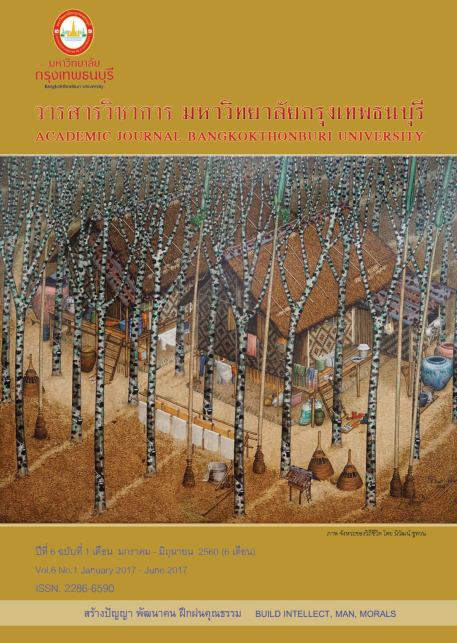ความสัมพันธ์ระหว่างทัศนคติต่อรัฐบาลและนายกรัฐมนตรี พลเอกประยุทธ์ จันทร์โอชา กับพฤติกรรมการติดตามรายการ “คืนความสุขให้คนในชาติ”
Main Article Content
Abstract
งานวิจัยครั้งนี้มีวัตถุประสงค์ที่จะ (1) ศึกษาพฤติกรรมการติดตามรับชมรายการ “คืนความสุขให้คนในชาติ” ที่นำเสนอโดยนายรัฐมนตรี พลเอก ประยุทธ์ จันทร์โอชา ของกลุ่มประชาชนที่มีทัศนะทางการเมืองที่หลากหลาย และ (2) วิเคราะห์ผลของการติดตามรับชมในเรื่องทัศนคติที่มีต่อรัฐบาลและนายกรัฐมนตรี (3) เพื่อนำไปสู่การปรับปรุงแนวทางการดำเนินรายการดังกล่าวให้มีผลในการสร้างความนิยมให้รัฐบาลและนายกรัฐมนตรี การวิจัยครั้งนี้เป็นการวิจัยแบบสำรวจเชิงปริมาณด้วยการใช้แบบสอบถามที่มีโครงสร้างกับกลุ่มตัวอย่างในกรุงเทพ 400 คน ในเขตพื้นที่ในกรุงเทพมหานครโดยสุ่มเขต 10 เขตในกรุงเทพมหานครจากพื้นที่ 50 เขต แล้วเก็บตัวอย่างแบบสะดวกเขตละ 40 คน กรอบทฤษฎีในการวิจัยครั้งนี้คือ Cognitive Dissonance (Festinger), Media Exposure (Finn), The Effects of Mass Communication (Klapper), Agenda Setting (McComb and Shaw, The Uses and Gratifcations of Mass Media (Mc Quail and Gurevitch) ผลการวิจัยชี้ให้เห็นว่าประชาชนส่วนใหญ่ได้รับชมรายการดังกล่าวโดยความบังเอิญมากกว่าตั้งใจ และเห็นว่ารายการดังกล่าวควรจะออกอากาศในช่องของรัฐบาลเท่านั้น และเวลาในการนำเสนอควรจะเป็น 30 นาที โดยให้มีนายกรัฐมนตรีและรัฐมนตรีอื่นๆ ที่เกี่ยวข้องกับสาระที่พูดมาร่วมนำเสนอ ประชาชนที่ติดตามดูรายการนี้ได้ติดตามข่าวสารบ้านเมือง แต่ไม่ค่อยได้นำไปใช้ประโยชน์ทางอื่น เช่นไม่ได้นำไปเป็นบทสนทนากับผู้อื่น ไม่ได้นำไปเป็นข้อแนะนำในการปฏิบัติตน ในการทดสอบสมมุติฐานพบว่า อายุ รายได้ การศึกษา อาชีพ การสังกัดพรรค และการได้ติดตามรับชมมีความสัมพันธ์กับทัศนคติที่มีนายกรัฐมนตรีและรัฐบาล คนที่มีอายุมาก คนที่มีรายได้ปานกลางถึงสูง คนที่มีการศึกษาระดับปริญญาตรีขึ้นไป คนที่ทำอาชีพส่วนตัว คนที่เป็นข้าราชการ คนที่เป็นพนักงานรัฐวิสาหกิจ คนที่เป็นพนักงานเอกชน คนที่เป็นเกษตรกร คนที่เป็นกรรมกร คนที่สังกัดพรรคประชาธิปัตย์ และคนที่ไม่สังกัดพรรคใดเลยมีความชื่นชมยกย่องพอใจและมั่นใจในการทำงานของนายกรัฐมนตรีและรัฐบาลมากกว่าคนที่มีอายุน้อย คนที่มีการศึกษาน้อย คนที่มีรายได้น้อย คนที่เป็นนักศึกษา และคนที่สังกัดพรรคเพื่อไทย รายการดังกล่าวตอกย้ำทัศนคติเชิงบวกที่มีต่อนายกรัฐมนตรีและรัฐบาลได้ แต่ไม่อาจจะเปลี่ยนใจคนที่มีทัศนคติเชิงลบต่อนายกรัฐมนตรีและรัฐบาลได้ สิ่งที่ควรปรับปรุงคือทำรายการให้สั้นลงไม่เกิน 30 นาที และควรจะออกอากาศเฉพาะช่องที่เป็นของรัฐคือ ช่อง 5 ช่อง 9 และ ช่อง 11 เพียงช่องใดช่องหนึ่งเท่านั้น และควรให้มีรัฐมนตรีคนอื่นที่เกี่ยวข้องกับงานมาร่วมเป็นผู้นำเสนอด้วยในขณะเดียวกันจะต้องตระหนักว่าการใช้รายการดังกล่าวสื่อสารกับประชาชน สามารถที่จะตอกย้ำและดำรงความชื่นชอบนายกรัฐมนตรีและรัฐบาลในกลุ่มประชาชนที่มีความคิดที่เป็นบวกกับนายกรัฐมนตรีและรัฐบาลมาก่อนแล้วเท่านั้น ไม่อาจจะใช้รายการดังกล่าวเปลี่ยนความคิดที่เป็นลบของประชาชนบางกลุ่มได้ หากจะเป็นทัศนคติของคนกลุ่มหลังนี้จะต้องใช้วิธีการอื่นๆ
The Relationship between Attitudes toward the Government and General Prayuth Chan-ocha, the Prime Minister and Viewing Behaviors of the Program “Return Happiness to Thai Citizens”
The objectives of this research were (1) to study viewing behaviors among people with diverse political ideas, regarding the TV program “Retuning Happiness to Thai People” program, presented by the Prime Minister, General Prayuth Chan-ocha, and (2) to analyze the impact of viewing in terms of their attitudes towards the Prime Minister and the Government. It was also (3) aimed at discovering ways to improve the program in order to create popularity for the Prime Minister and the Government. The method used was a quantitative survey research with a structured questionnaire being distributed among 400 respondents in Bangkok. Ten districts were randomly selected from the total of 50 districts, and 40 persons were selected by means of convenience sampling in each selected district. The theoretical framework of the study included Cognitive Dissonance (Festinger), Media Exposure (Finn), The Effects of Mass Communication (Klapper), Agenda Setting (Mc Comb and Shaw, The Uses and Gratifcations of Mass Media (Mc Quail and Gurevitch) The fndings revealed that most people were exposed to the program by accident rather by intention to watch, and they wanted the program to be televised on only one channel. It could be Channel 5, Channel 9, or Channel 11, which are stated-owned stations. An appropriate duration of the program should be no longer than 30 minutes, and presenters should be the Prime Minister and other Ministers responsible for the issues discussed in the program. The only gratifcation they got from viewing the program was to keep up with political news; they did not use what they gained from the program as contents for interpersonal communication or as guidance for their behaviors. Age, income, occupation, education, political party affliation, and exposure to the program were proved to be related to attitudes towards the Prime Minister and
the Government. People with higher ages, with higher incomes, with higher education levels, working people, Democrat Party members, non partisans, and frequent viewers were more likely to have positive attitudes towards the Prime Minister and the Government than those with younger ages, with low incomes, with low education levels, students, and Pheu Thai Party members. The program could reinforce positive attitudes towards the Prime Minister and the Government, but could not reverse attitudes among those who held negative attitudes against the Prime Minister and the Government. The researcher recommended that the program be improved as follows: the duration should not exceed 30 minutes, televised on one of the state-owned channels, namely Channel 5, Channel 9, or Channel 11, the Prime Minister and other Ministers responsible for relevant issues should be presenters. It should be realized that the program is capable
of reinforcing existing positive predispositions towards the Prime Minister and the Government, but it is not capable of reversing negative predispositions. If the Governmentwants to reverse negative attitudes, other measures are deemed necessary.


